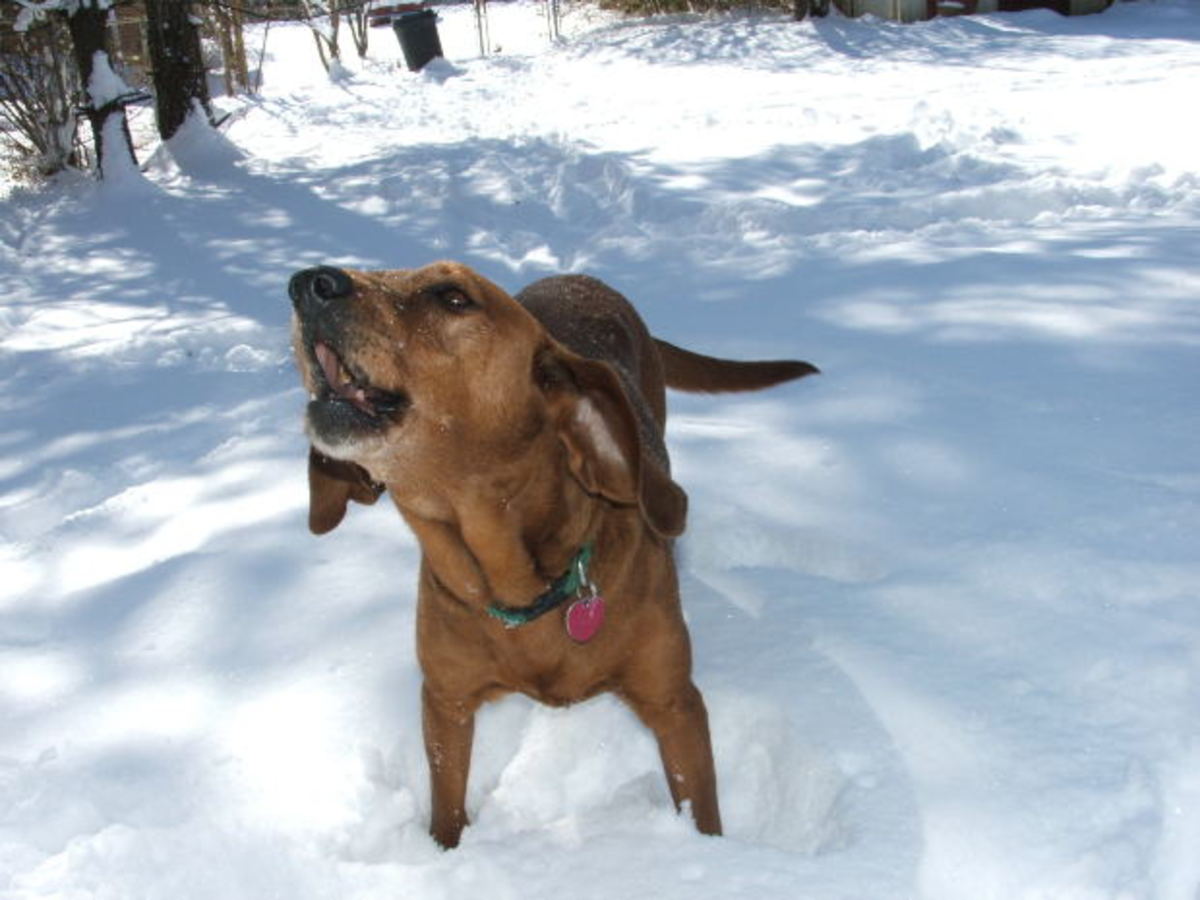Is a Dog Begging for Food or Does It Just Have Expectations?

Do Dogs Really Beg or Are We the Mistaken Ones?
I was raised by parents who believed that allowing dogs to beg was not appropriate, and I've continued to follow that belief as an adult with my own dogs. To confirm what my definition of begging has always been: if a dog is sitting at my feet and 100% of its focus is on my food, it's begging.
I had managed to keep my beliefs about food begging through decades of living with highly-skilled, medium and large-sized dogs. However, this time-honored belief system was shaken to its roots, and finally changed, by a little dachshund only last week.
When a dog is begging, you not only have its full attention, but it makes sure that it has yours. The dog leans against your leg just a tad too much, and when you look down at it, two soulful, starving-waif eyes are gazing up at you. (If you look down too long, you can even get lost in them.)
Or, to get your attention, it plops down over one foot. You move your foot out from under the warm belly. If the dog can span both feet, the next thing you know, both feet are covered with dog. You look down to tell dog to move, and those sad, liquid eyes are after you again, saying, "Didja know I was down here? Didja? And didja know I'd like some of that? Yup. Me. Pooorrr little starving me."
Luckily I've never had the variety of mooch that would reach up and snatch whatever morsel she desired (they've all been girl dogs). That would have seemed very aggressive.
However, I did foster a dog that was vocal in a very passive-aggressive way. She'd moan low in her throat, or grunt, or exhale as loudly as possible over and over again when she was begging, to make sure I knew she was there. I was trying to make her stop by ignoring her until she went away. It made me think of the time I had a first-floor office. People popped in frequently only to ask for directions to another business in the building. Instead of just saying "hello", they would clear their throats. I always had to smile, because that's how I knew which of them were sure that this was not the appropriate place to be asking for directions to our competitors. I always had to smile at my vocal beggar, too, when she was moaning, grunting or exhaling so loudly. Unfortunately, my smile delayed any effective training; she was looking for that smile, even though I was refusing to look at her.
I gave in to begging once, for a sweet old dog that had never, ever begged. That time, she couldn't help herself. It was, after all, a beautiful, juicy steak, and the kitchen was filled with it's lovely aroma. She was almost beside herself from just smelling it. I decided that, if she wanted it that badly after years of not begging, I would give her a bite that one time. So, after I had everything prepared for this perfect meal and was settled at the dining room table to enjoy it, I cut the first bite and graciously offered it to her. She became so excited by that one little bite that she began to tremble all over. Then she passed a huge volume of gas, and I had to rush my steak out of the room to avoid having it tainted by the stench.
Other than that, I've always been ruthless in my response, no matter what variation of pleading was pulled from the doggie bag of tricks. I either ignored my dog, told her to go lie down, or I waited at least 15 minutes before I placed morsels I had saved for her into her dish.
A little while after the demise of my last old girl, I ran across an article discussing the ingredients in dry and canned dog food. It was an eye opener; this dog "food" includes feathers, body scraps from diseased animals and other offal that I wouldn't have allowed any dog to eat, if it hadn't been dehydrated and ground up, then colored, scented, formed into bite-sized chunks and sold to me as healthy. I was horrified!
I also learned that dogs who are fed real food tend to live a lot longer. So I decided to feed my next dog real food. And, because real food costs more than dehydrated road-kill and diseased body parts, I also decided that my next dog would be smaller.
I adopted Lulu, a sweet little dachshund that I had met when she had lived with the mother of a friend. So here I am with a small dog and the determination to feed her from my own food choices (with a little extra cooking to make sure that her dietary needs are met - she doesn't like salads). She's very quiet and respectful when she's sitting at my feet or beside me, expecting to be fed.
Somehow, my new inclination is to think that, if she's always going to eat what I eat, and she eats so little, it seems rude not to just feed her bites now and then as I eat. (I must apologize here. I know that any dog trainer reading this has just heaved a huge, frustrated sigh, because the messages about how dogs really think don't seem to be reaching us, no matter how they're presented.)
I was hesitant at first, but Lulu's comfort with this arrangement quickly reassured me, and for a few days we were both happy eating together. It didn't seem like begging when I intended for her to eat what I eat, and she was on the same page. The only difference between us that first day had been one of timing; she expected to be fed right then, and I had thought I'd feed her after I was done eating. With no effort at all, Lulu's mellow, self-assured attitude quickly convinced me that our timing difference was really irrelevant; it was only my pickiness and not normal behavior. So I fed her as I ate. It worked for both of us.
But then a friend came over, and my comfort level did a nosedive under the pressure of expected doggie manners. Lulu was sitting at my friend's feet, patiently expecting to share in her snack. As Lulu had lived with me for less than a week, my friend assumed the best, and said, " Well, I can see one thing you'll need to train her not to do." Poor, innocent, trusting friend; she didn't know that, in my new-found zeal to provide Lulu with real food, I'd been feeding her just like that.
Now I have to view Lulu's expectations through the eyes of guests who may be eating at my house. To them, the behavior that Lulu and I consider normal is doggie being rude and probably also master being unsanitary, even though I am careful. If it continues after she has lived here for a while, it will soon be viewed as master having no control over this small Lulu. Needless to say, I don't want people thinking that, in my own house, I have no control over a dog that doesn't even reach halfway to my knee.
I think I've found a solution, but it's going to be a tricky one. I will continue to feed Lulu as I eat, but only when we're alone. And I'll only allow her to beg with specific people who already know her from her previous home, and don't mind it.
But how do I maintain this hypocrisy so my image as a good master isn't tarnished? And how do I train that combination of behaviors without giving Lulu an ulcer from sheer confusion? I thought about that for a long time before I found the answer.
I've decided to engage my job skills. I'll write an instruction manual for dachshunds; not a manual for a master to read when training the dog, but a manual for the dog to read, so the instructions can be followed directly. It will not only give Lulu a clear set of instructions, complete with the necessary contexts for different behaviors, but it will also reduce repetition on my part. When she's not doing it correctly, I'll simply refer her to her personal instruction manual.
Of course, a few pre-training steps have to be completed first. I can see that I'll need to invent a new written picture language that Lulu can read, basically a set of doggie hieroglyphics. Then I'll have to teach her what reading is, and how to read her new language. After I've completed those steps, having her use her instruction manual should be a breeze; any training complicated by visitor context or other circumstances will become perfectly understandable for her. From that point on, I see our communication as becoming almost ideal. I'll even be able to leave Lulu reminder notes low down on the refrigerator door.
A Nod to Hardworking Dog Trainers
Please support the writing that you like
If you vote up or vote down an author's writing, you will show the people who follow you what you feel the quality of the writing is. Please support writers by voting up their work.




